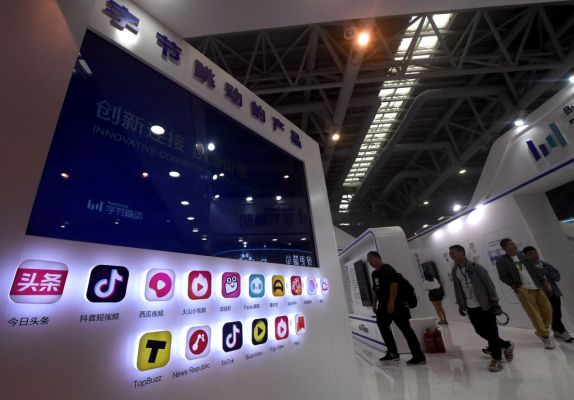In China, Toutiao is literally big news.
Not only has its parent company ByteDance achieved a $75 billion valuation, two of its apps — Toutiao, a news aggregator, and Douyin (Tik Tok in China) — are chipping into WeChat’s user engagement numbers, no small feat considering the central role WeChat plays in the daily lives of the region’s smartphone users.
The success of Toutiao (its name means “headline”) prompts the question: why hasn’t one news aggregator app achieved similar success in the United States? There, users can pick from a roster of news apps, including Google News, Apple News (on iOS), Flipboard, Nuzzel and SmartNews, but no app is truly analogous to Toutiao, at least in terms of reach. Many readers still get news from Google Search (not the company’s news app) and when they do use an app for news, it’s Facebook.
The top social media platform continues to be a major source of news for many Americans, even as they express reservations about the reliability of the content they find there. According to research from Columbia Journalism Review, 43% of Americans use Facebook and other social media platforms to get news, but 57% said they “expect the news they see on those platforms to be largely inaccurate.” Regardless, they stick with Facebook because it’s timely, convenient and they can share content with friends and read other’s comments.
The social media platform is one of the main reasons why no single news aggregator app has won over American users the same way Toutiao has in China, but it’s not the only one. Other factors, including differences between how the Internet developed in each country, also play a role, says Ruiwan Xu, the founder and CEO of CareerTu, an online education platform that focuses on data analytics, digital marketing and research.
While Americans first encountered the Internet on PCs and then shifted to mobile devices, many people in China first went online through their smartphones and the majority of the country’s 800 million Internet users access it through mobile. This makes them much more open to consuming content — including news and streaming video — on mobile.
By contrast, a recent Pew Research study found that the largest segment of Americans, about 44%, still prefer getting their news through television, compared to the 34% who prefer online sources.
Xu notes that most online content creators in the United States are already tied to Facebook, Instagram or YouTube, which reinforces those platforms’ advantages over news aggregator apps. In China, however, “content aggregators like Toutiao are extremely new and helpful to people,” she says.
One of Facebook’s advantages is convenience. According to Pew Research, almost 70% of American adults already use the platform. Toutiao is much newer (it launched in 2012), but it was designed to remove friction for first-time users. For example, they don’t need to create a log-in or link social media accounts, though they can. Toutiao uses algorithms to surface articles tailored to each users’ browsing habits and also features content from ByteDance’s short video apps, including Douyin, one of the most popular apps in China.
How China’s tech industry allows new leaders to emerge
In the U.S., the relative maturity of platforms owned by the biggest Internet companies, in particular Facebook, Instagram and YouTube, combined with the continuing popularity of television news, leaves comparatively little breathing room for news aggregator apps.
Xu said the influence of Facebook, Amazon, Apple, Google and other major companies have also created key differences in tech entrepreneurship between the United States and China. Their dominance means that first movers “stay number one for a while,” says Xu. But in China, she notes that “there are a lot more entrepreneurial opportunities for startups to turn into giants.”
Baidu, Alibaba and Tencent (WeChat’s owner) are so important to the Chinese Internet industry that they are known collectively as BAT. Over the past couple of years, however, ByteDance has been referred to as the new B in BAT, taking over search leader Baidu’s spot. The rapid growth of new apps like Toutiao, Meituan and Didi, all created for mobile, also means that there is a new acronym, TMD.
Released in 2011, WeChat is China’s biggest mobile app, and features like online payments and mini-programs (or apps within the app) have made it an essential part of life for almost everyone who owns a smartphone in China. But even WeChat’s ubiquity, which arguably means it plays a much bigger role in the lives of Chinese users than Facebook does in America, has left room for other apps to gain prominence.
All this makes it more difficult for a news aggregator app to reach the same prominence in the U.S. as Toutiao has in China. Even other popular social media platforms are struggling to compete in terms of news discovery. Despite Twitter’s social impact, it is still trying to figure out how to engage casual users, who only follow a few accounts; many of its newest features, including its updated Explore feed, “what you missed” highlights and website redesign, were designed to tackle that challenge.
Instead, the key for news aggregators in the U.S. may be to target specific demographics. For example, SmartNews, the subject of a recent Extra Crunch profile, has built a reputation for attracting slightly older users (or 25 and above) who want to explore news coverage from different perspectives, while Flipboard and Apple News are both known for magazine-style layouts and curated content.
It will still be hard, however, for any news app to compete for eyeballs with Facebook. As Wan notes, “in the U.S., the only thing that can be closely compared to Toutiao for short-form content is probably Facebook.”
